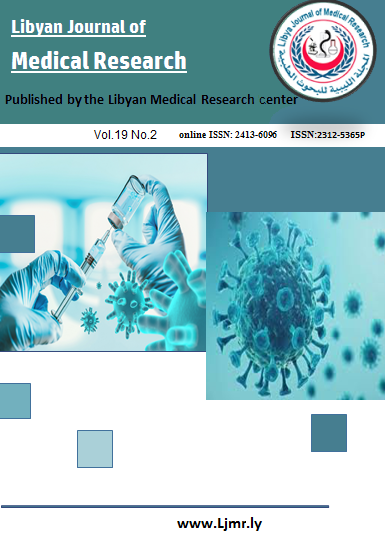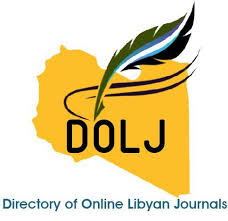Assessment of Groundwater Quality from a Chemical and Microbiological Perspective in Selected Domestic Wells in Al-Sarraj, Tripoli
DOI:
https://doi.org/10.54361/LJMR.19.2.40Keywords:
Groundwater, Drinking water, Escherichia coli, Water quality, Microbiological contamination, LibyaAbstract
Background: Access to safe drinking water remains a global challenge, particularly in arid regions such as Libya, where groundwater is the primary source of domestic water supply. This study assessed the chemical and microbiological quality of groundwater from selected domestic wells in western Tripoli and compared results with Libyan drinking water standards. Material and Methods: A total of 20 groundwater samples were collected from domestic wells (35–100 m depth) in Al-Sarraj, Janzour, Al-Swani, and Bu Ghubba. Physicochemical parameters, including pH, electrical conductivity (EC), total dissolved solids (TDS), major ions, and hardness, were analyzed. Microbiological analyses targeted total coliforms, Escherichia coli, and total bacterial counts. Statistical analysis was performed using ANOVA. Results: Most samples exceeded Libyan standards for TDS (>3000 mg/L) and total hardness (>1400 mg/L). Approximately 60% of shallow wells (35–60 m) exhibited the highest contamination rates. E. coli concentrations reached up to 129 CFU/100 mL. Overall, the majority of wells were unsuitable for human consumption. Conclusions: Domestic wells in western Tripoli exhibit significant chemical and microbial contamination, rendering them unsafe for drinking water. Urgent interventions, including regular monitoring, enforcement of drilling regulations, and public awareness campaigns, are required.
Downloads
References
1. 1. Macler BA, Merkle JC. Current knowledge on groundwater microbial pathogens and their control. Hydrogeol J. 2000;8(1):29–40.
2. 2. UNICEF. Assessment of water quality, sanitation, and hygiene in Libyan schools. Tripoli (LY): UNICEF and the National Centre for Disease Control; 2017.
3. 3. Setianto YA, Hartono G, Gravitiani E. Effect of polluted well water by bacteria E. coli to urinary tract infections in pregnant women. Pollut Res J. 2021;40(1):12–20.
4. 4. Hamed K, Abdulsalam S. Field study on the quality of drinking water in the Murzuq region. J Appl Sci. 2019;1(1):90–99.
5. 5. Alarbash M, Mabrouk M. Study of groundwater quality and its suitability for drinking from a chemical perspective in the city of Ajilat. J Sci, Univ Al-Zawiya. 2017;1(1):45–52.
6. 6. Alrawashda Z. Groundwater pollution issues in the Green Mountain region. Libyan J Agric Res. 2012;3(2):1369–1415.
7. 7. Alabdali B, Alayeb M, Alzarbi A. Assessment of groundwater quality in the Bercis region, Green Mountain. Libyan J Environ Sci Technol. 2020;11:16–22.
8. 8. Alhaloub R, Nasr M. Estimation of total hardness and some essential elements in bottled drinking water samples in the city of Misrata. [Master’s thesis]. Misrata (LY): Libyan Academy; 2014.
9. 9. Albaroni S. Overexploitation of groundwater in Libya. Eng Mag. 1997;1(1):36–37.
10. 10. Nair GA, Bohjuari JA, Al-Mariami MA, Attia FA, El-Toumi FF. Groundwater quality of north-east Libya. J Environ Biol. 2006;27(4):695–700.
Downloads
Published
Issue
Section
License
Copyright (c) 2025 Ibrahim E. Gharibi, Mohamad Orhuma, Abubaker Abutartour, Nour AlShamakhi, Lotfia El Majdoub, Hajar AlGhariani (Author)

This work is licensed under a Creative Commons Attribution-NonCommercial-NoDerivatives 4.0 International License.
Open Access Policy
Libyan journal of medical Research (LJMR).is an open journal, therefore there are no fees required for downloading any publication from the journal website by authors, readers, and institution.
The journal applies the license of CC BY (a Creative Commons Attribution 4.0 International license). This license allows authors to keep ownership f the copyright of their papers. But this license permits any user to download , print out, extract, reuse, archive, and distribute the article, so long as appropriate credit is given to the authors and the source of the work.
The license ensures that the article will be available as widely as possible and that the article can be included in any scientific archive.
Editorial Policy
The publication of an article in a peer reviewed journal is an essential model for Libyan journal of medical Research (LJMR). It is necessary to agree upon standards of expected ethical behavior for all parties involved in the act of publishing: the author, the journal editorial, the peer reviewer and the publisher.
Any manuscript or substantial parts of it, submitted to the journal must not be under consideration by any other journal. In general, the manuscript should not have already been published in any journal or other citable form, although it may have been deposited on a preprint server. Authors are required to ensure that no material submitted as part of a manuscript infringes existing copyrights, or the rights of a third party.
Authorship Policy
The manuscript authorship should be limited to those who have made a significant contribution and intellectual input to the research submitted to the journal, including design, performance, interpretation of the reported study, and writing the manuscript. All those who have made significant contributions should be listed as co-authors.
Others who have participated in certain substantive aspects of the manuscript but without intellectual input should only be recognized in the acknowledgements section of the manuscript. Also, one of the authors should be selected as the corresponding author to communicate with the journal and approve the final version of the manuscript for publication in the LJMR.
Peer-review Policy
- All the manuscripts submitted to LJMR will be subjected to the double-blinded peer-review process;
- The manuscript will be reviewed by two suitable experts in the respective subject area.
- Reports of all the reviewers will be considered while deciding on acceptance/revision or rejection of a manuscript.
- Editor-In-Chief will make the final decision, based on the reviewer’s comments.
- Editor-In-Chief can ask one or more advisory board members for their suggestions upon a manuscript, before making the final decision.
- Associate editor and review editors provide administrative support to maintain the integrity of the peer-review process.
- In case, authors challenge the editor’s negative decision with suitable arguments, the manuscript can be sent to one more reviewer and the final decision will be made based upon his recommendations.














